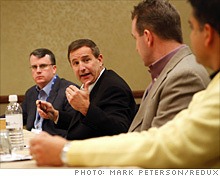 What a time to be in corporate public relations…can you pick three corporations right now that have been in a boat load of trouble lately? Right alongside these three examples are CEOs at the helm suffering from poor brand image as they take the fall for the team.
What a time to be in corporate public relations…can you pick three corporations right now that have been in a boat load of trouble lately? Right alongside these three examples are CEOs at the helm suffering from poor brand image as they take the fall for the team.
>>Avon. CEO Andrea Jung is struggling with recent mismanagement. Stories in the Wall Street Journal and elsewhere suggest her leadership is suspect. Forecasts are way off base, the SEC has launched and investigation, and investors are none too pleased.
(Aside: I used to sell Avon; so did my mom. I was my own best customer. I still love many of its products but the line diversified to include Curves fitness products, attire and a teen line. Way too much; unruly, but who asked me?)
>>Netflix. No surprise, right? This company flip flopped its subscribers about DVDs and pricing while opening new markets in the UK at the same time. Who is tired of reading about Reed Hastings’s PR debacle already? Read the link on this; Gini does a fab job of rehashing the entire mess, so no need to reinvent the wheel here.
>>H-P. I was surprised to learn the company would spin off its PC business unit. Without its flagship product line as a source of revenue, how would it meet expectations on Wall Street? Then, after installing Meg Whitman, former e-Bay executive and California gubernatorial candidate, as CEO, the company flip flopped and decided to keep computers in its product suite. H-P cited expense as a deciding factor.
I am certain you have more examples to share of corporate flip flops that unfolded in the public domain.
Now, let’s segue to the corporate boardroom. For sure there is a chief public relations officer who has a seat at these boardroom tables? I mean, right? One would expect serious PR strategy and input into serious corporate decisions that impact investors, analysts, stakeholders, consumers, the media, and more.
Why then are these corporations being “permitted” to make these customer-facing errors as if they weren’t thought through? Is there no PR counsel at the table or is PR not being invited to lend its expertise? Honestly, watching these gaffes unfold and multiplied hundredfold by word-of-mouth marketing makes me wonder.
The H-P debacle is pretty intense. The company just told the world it really didn’t want to devote innovation to its PCs; rather, it would produce subpar product. That’s my takeaway after a spinoff failed. I already have a negative image of H-P’s computers anyway; having them try to get out of that business doesn’t bode well for future sales.
For any business regardless of size, here is the type of PR counsel I provide (as do my colleagues):
>>We are trained in strategy to assess the effect of corporate decisions on markets and external audiences.
>>We know how to create story angles and to which media to pitch them for best light in sticky situations.
>>We contribute to messages developed with each audience in mind, and we draft appropriate communications targeting each.
>>We anticipate the backlash and negative impact of un-vetted business decisions.
>>We develop ongoing strategy to counter market pulse and rebuild damaged brands.
It strikes me that corporate PR, in two out of three of the above examples, is getting the raw end of the stick. Who’s responsible for allowing these very public gaffes; certainly no reputable PR professional would counsel its C-suite to engage in flip flop at the risk of damaging stock, brand, sales, and future growth.






